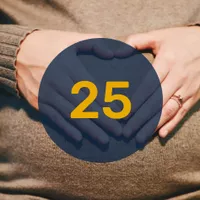Davidova žena bo rodila še enega otroka.
|Frau||gebären||einen|Kind
David's|wife|will|give birth|another|one|child
Davids Frau steht kurz vor der Geburt eines weiteren Kindes.
David's wife is about to give birth to another child.
Imata že sina in hčer.
|schon|||
They have|already|son|and|daughter
They already have a son and a daughter.
Novega otroka se zelo veselita.
neues||||freuen
New|child|themselves|very|are happy
Sie freuen sich sehr über ihr neues Baby.
They are very excited about their new baby.
Otrok bo fant.
||Junge
The child|will|boy
The baby will be a boy.
Vendar ne vesta, katero ime bi mu dala.
||wissen|welches||||geben
However|not|they know|which|name|would|to him|give
But they don't know what name to give it.
Odločita se vprašati svoje starše.
||||Eltern
They decide to ask their parents.
Starši jima dajo nekaj idej.
The parents|to them|give||ideas
Parents give them some ideas.
Nekatere ideje so boljše od drugih.
Some|ideas|are|better|than|others
Some ideas are better than others.
David in njegova žena bosta otroku dala ime Miran.
David|and|his|wife|will|to the child|give|name|Miran
David and his wife will name the baby Miran.
Upata, da bo otrok zadovoljen s tem imenom.
||||zufrieden|||
I hope|that|will be|child|satisfied|with|this|name
They hope the child will be happy with the name.
Sedaj pa ista zgodba, povedana na drugačen način.
Now|but|same|story|told|in|different|way
Moja žena pričakuje otroka.
||erwartet|
My|wife|is expecting|child
My wife is expecting a baby.
Imava že sina in hčer.
We have|already|son|and|daughter
We already have a son and a daughter.
Novega družinskega člana se zelo veseliva.
|Familien-|Mitglied|||freuen
New|family|member|ourselves|very|are happy
We are very much looking forward to welcoming a new family member.
Novi otrok bo fant.
New|child|will|boy
The new baby will be a boy.
Vendar ne veva, katero ime bi mu dala.
However|not|we know|which|name|would|to him|give
But we don't know what name to give it.
Odločila sva se, da vprašava najine starše.
|||||unsere|
We decided|(dual)|reflexive pronoun|to|ask|our|parents
We decided to ask our parents.
Starši so nama dali nekaj idej.
The parents|(past tense verb 'to be')|to us|gave|some|ideas
My parents gave us some ideas.
Nekatere ideje so boljše od drugih.
|||||anderen
Some|ideas|are|better|than|others
Some ideas are better than others.
Otroku sva dala ime Miran.
We gave the child|we|name|name|Miran
We named our child Miran.
Upava, da bo otrok s svojim imenom zadovoljen.
We hope|that|will|child|with|his|name|satisfied
Wir hoffen, dass das Kind mit seinem Namen zufrieden sein wird.
We hope the child will be happy with his name.
Vprašanja:
Questions
Ena: Davidova žena bo imela otroka.
One|David's|wife|will|have|child
Erstens: Davids Frau wird ein Kind bekommen.
Kaj bo imela Davidova žena?
What|will|have|David's|wife
Davidova žena bo imela otroka.
David's|wife|will|have|child
David's wife will have a child.
Dva: David in njegova žena že imata dva otroka, enega sina in eno hčer.
Two|David|and|his|wife|already|have|two|children|one|son|and|one|daughter
Two: David and his wife already have two children, one son and one daughter.
Koliko otrok imata David in njegova žena?
How many|children|do they have|David|and|his|wife
Imata dva otroka, enega sina in eno hčer.
|||einen||||
They have|two|children|one|son|and|one|daughter
They have two children, one son and one daughter.
Tri: Novega otroka se zelo veselita.
They (3 people)|New|child|themselves|very|are happy
Tri: They are very excited about the new baby.
Kako se počutita glede novega otroka?
How|themselves|feel|about|new|child
Was hältst du von dem neuen Baby?
How do you feel about the new baby?
Novega otroka se zelo veselita.
New|child|themselves|very|are happy
Štiri: Novi otrok bo fant.
Four|New|child|will|boy
Bo novi otrok dekle?
|||Mädchen
Will the new baby be a girl?
Ne, novi otrok ne bo dekle.
No|new|child|not|will|girl
Novi otrok bo fant.
New|child|will|boy
Pet: Ne vesta, katero ime bi dala otroku.
They|not|know|which|name|would|give|to the child
Ali vesta, katero ime bi dala otroku?
Do|you know|which|name|would|give|to the child
Ne, ne vesta, katero ime bi dala otroku.
No|not|know|which|name|would|give|to the child
Šest: O imenih za otroka se odločita vprašati svoja starša.
Six|About|names|for|child|themselves|will decide|to ask|their|parents
Six: You decide to ask your parents about names for your child.
Kaj se odločita?
What|themselves|will decide
What do they decide?
O imenih za otroka se odločita vprašati svoje starša.
About|names|for|child|themselves|will decide|to ask|their|parents
They decide to ask their parents about names for the baby.
Sedem: Starši jima dajo nekaj idej.
Seven|Parents|to them|give||ideas
Kaj storijo starši?
What|do|parents
What do parents do?
Starši jima dajo nekaj idej.
The parents|to them|give|some|ideas
Osem: Nekatere ideje so boljše od drugih.
Eight|Some|ideas|are|better|than|others
So bile vse ideje dobre?
Were|all|ideas|good|
Were all the ideas good?
Ne, vse ideje niso bile dobre.
No|all|ideas|were not|good|good
Nekatere ideje so bile boljše od drugih.
Some|ideas|were|better|than|from|others
Devet: David in njegova žena sta otroka poimenovala "Miran".
|||||||nennen|
Nine|David|and|his|wife|are|child|named|Miran
Nine: David and his wife named their child "Miran".
Kako sta David in njegova žena poimenovala otroka?
How|did|David|and|his|wife|named|child
Poimenovala sta ga "Miran".
They named|were|him|Miran
Deset: David in njegova žena sta upala, da bo otrok s svojim imenom zadovoljen.
Ten|David|and|his|wife|were|hopeful|that|will be|child|with|his|name|satisfied
Kaj sta upala David in njegova žena?
What|were|hoping|David|and|his|wife
Upala sta, da bo otrok s svojim imenom zadovoljen.
They hoped|were|that|will be|child|with|his|name|satisfied

